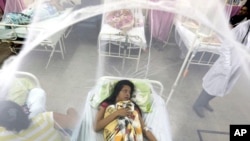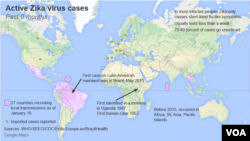The U.N. High Commissioner for Human Rights says respecting women’s human rights and granting them access to reproductive health services are essential in the fight against the Zika virus. The virus is thought to be linked to an upsurge of birth defects in Latin America.
Scientists are trying to determine if there is a definitive link between an outbreak of Zika virus in Brazil and more than 4,500 suspected cases of microcephaly, which causes babies to be born with abnormally small heads and brains.
Evidence for such a link is strong enough that a number of countries in Latin America are running scared and are making tough demands upon women. U.N. High Commissioner for Human Rights Zeid Ra’ad Al Hussein notes that some governments are asking women to delay getting pregnant, but are not providing them with the means to control or prevent an unwanted pregnancy.
The high commissioner’s spokeswoman, Cecile Pouilly, says women and girls face an extremely difficult situation in Zika-affected countries that have restrictive laws governing women’s reproductive rights.
“In situations where sexual violence is rampant, and sexual and reproductive health services are criminalized, or simply unavailable, efforts to halt this crisis will not be enhanced by placing the focus on advising women or girls not to become pregnant," said Pouilly.
Affordable health services
Pouilly says upholding human rights are essential to an effective public health response. She says governments must ensure that women, men and adolescents have access to comprehensive and affordable sexual and reproductive health services.
She tells VOA that El Salvador is a country where women experience a great deal of sexual violence, yet have no way to legally protect themselves from getting pregnant or terminating an unwanted pregnancy.
“We know, indeed, that abortion is criminalized in all instances. That is why we are asking those governments to go back and change those laws because how can they ask for those women not to become pregnant, but also not offer them—first an information that is available, but also the possibility to stop their pregnancies if they wish so," she said.
Contraception, save abortion services
Pouilly says comprehensive reproductive health services include contraception, maternal healthcare and safe abortion services to the full extent of the law.
She says these health services must be delivered with a woman’s fully informed consent, be non-discriminatory, and respectful of her rights.






